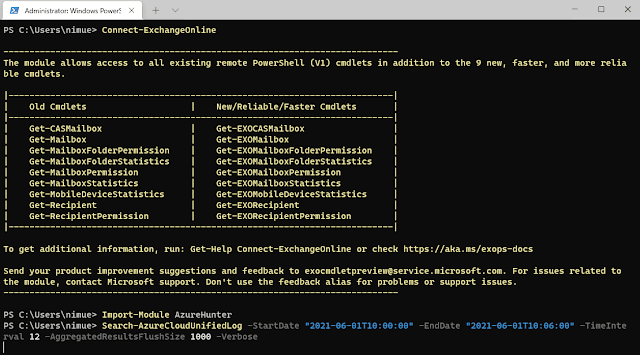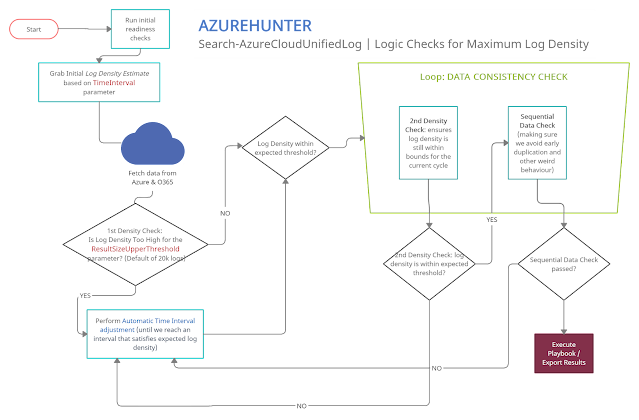AzureHunter - A Cloud Forensics Powershell Module To Run Threat Hunting Playbooks On Data From Azure And O365
A Powershell module to run threat hunting playbooks on data from Azure and O365 for Cloud Forensics purposes. The following roles are required in Exchange Online, in order to be able to have read only access to the UnifiedAuditLog: These roles are assigned by default to the NOTE: if you are a security analyst, incident responder or threat hunter and your organization is NOT giving you read-only access to these audit logs, you need to seriously question what their detection and response strategy is! More information: NOTE: your admin can verify these requirements by running Please make sure you have ExchangeOnlineManagement (EXOv2) installed. You can find instructions on the web or go directly to my little KB on how to do it at the soc analyst scrolls All you need to do is: The unified audit log contains user, group, application, domain, and directory activities performed in the Microsoft 365 admin center or in the Azure management portal. For a complete list of Azure AD events, see the list of RecordTypes. The UnifiedAuditLog is a great source of cloud forensic information since it contains a wealth of data on multiple types of cloud operations like ExchangeItems, SharePoint, Azure AD, OneDrive, Data Governance, Data Loss Prevention, Windows Defender Alerts and Quarantine events, Threat intelligence events in Microsoft Defender for Office 365 and the list goes on and on! AzureHunter implements some useful logic to ensure that the highest log density is mined and exported from Azure & O365 Audit Logs. In order to do this, we run two different operations for each cycle (batch): It's recommended that you run AzureHunter has two main commands: The purpose of The purpose of When running Finally This command will: We assume that you have exported UnifiedAuditLog records to a CSV file, if so you can then do: You can run more than one playbook by separating them via commas, they will run sequentially: Since the aftermath of the SolarWinds Supply Chain Compromise many tools have emerged out of deep forges of cyberforensicators, carefully developed by cyber blacksmith ninjas. These tools usually help you perform cloud forensics in Azure. My intention with AzureHunter is not to bring more noise to this crowded space, however, I found myself in the need to address some gaps that I have observed in some of the tools in the space (I might be wrong though, since there is a proliferation of tools out there and I don't know them all...): If, however, you are looking for a more feature rich and mature application for Azure Cloud Forensics I would suggest you check out the excellent work performed by the cyber security experts that created the following applications: I'm sure there is a more extensive list of tools, but these are the ones I could come up with. Feel free to suggest some more. For more information
1. Check that you have the right O365 Permissions
View-Only Audit Logs or Audit Logs.Compliance Management role group in Exchange Admin Center.
Get-ManagementRoleEntry "*\Search-UnifiedAuditLog" in your Azure tenancy cloud shell or local powershell instance connected to Azure.
2. Ensure ExchangeOnlineManagement v2 PowerShell Module is installed
3. Either Clone the Repo or Install AzureHunter from the PSGallery
3.1 Cloning the Repo
Import-Module .\source\AzureHunter.psd1
3.2 Install AzureHunter from the PSGallery
Install-Module AzureHunter -Scope CurrentUser
Import-Module AzureHunter
What is the UnifiedAuditLog?
AzureHunter Data Consistency Checks
Ensure you connect to ExchangeOnline
Connect-ExchangeOnline before running any AzureHunter commands. The program checks for an active remote session and attempts to connect but some versions of Powershell don't allow this and you need to do it yourself regardless.
Run AzureHunter
Search-AzureCloudUnifiedLog and Invoke-HuntAzureAuditLogs.Search-AzureCloudUnifiedLog is to implement a complex logic to ensure that the highest percentage of UnifiedAuditLog records are mined from Azure. By default, it will export extracted and deduplicated records to a CSV file.Invoke-HuntAzureAuditLogs is to provide a flexible interface into hunting playbooks stored in the playbooks folder. These playbooks are designed so that anyone can contribute with their own analytics and ideas. So far, only two very simple playbooks have been developed: AzHunter.Playbook.Exporter and AzHunter.Playbook.LogonAnalyser. The Exporter takes care of exporting records after applying de-duplication and sorting operations to the data. The LogonAnalyser is in beta mode and extracts events where the Operations property is UserLoggedIn. It is an example of what can be done with the playbooks and how easy it is to construct one.Search-AzureCloudUnifiedLog, you can pass in a list of playbooks to run per log batch. Search-AzureCloudUnifiedLog will pass on the batch to the playbooks via Invoke-HuntAzureAuditLogs.Invoke-HuntAzureAuditLogs can, be used standalone. If you have an export of UnifiedAuditLog records, you can load them into a Powershell Array and pass them on to this command and specify the relevant playbooks.
Example 1 | Run search on Azure UnifiedAuditLog and extract records to CSV file (default behaviour)
Search-AzureCloudUnifiedLog -StartDate "2020-03-06T10:00:00" -EndDate "2020-06-09T12:40:00" -TimeInterval 12 -AggregatedResultsFlushSize 5000 -Verbose
AggregatedResultsFlushSize parameter speficies the batches of records that will be processed by downstream playbooks. We are telling AzureHunter here to process the batch of records once the total amount reaches 5000. This way, you can get results on the fly, without having to wait for hours until a huge span of records is exported to CSV files.
Example 2 | Run Hunting Playbooks on CSV File
$RecordArray = Import-Csv .\my-exported-records.csv
Invoke-HuntAzureAuditLogs -Records $RecordArray -Playbooks 'AzHunter.Playbook.LogonAnalyser'$RecordArray = Import-Csv .\my-exported-records.csv
Invoke-HuntAzureAuditLogs -Records $RecordArray -Playbooks 'AzHunter.Playbook.Exporter', 'AzHunter.Playbook.LogonAnalyser'
Why?
UnifiedAuditLog. This API is very unstable and inconsistent when exporting large quantities of data. I wanted to develop an interface that is fault tolerant (enough) to address some of these issues focusing solely on the UnifiedAuditLog since this is the Azure artefact that contains the most relevant and detailed activity logs for users, applications and services.Playbooks. I wanted to come up with a simple framework that would help the community create and share new playbooks to extract different types of meaning off the same data.
Why Powershell?
TODO
More Information
Credits
- Hack And Tools
- Pentest Tools Review
- Pentest Reporting Tools
- Hack Tools Download
- Install Pentest Tools Ubuntu
- Best Hacking Tools 2020
- Hacking App
- Hackers Toolbox
- Hack Tools 2019
- World No 1 Hacker Software
- Pentest Box Tools Download
- Hacking Tools For Windows Free Download
- Pentest Tools Linux
- Hacker
- Computer Hacker
- Pentest Tools For Ubuntu
- Pentest Tools Linux
- Hacker Tools For Pc
- Hack Tools Pc
- Hacker Tools
- Pentest Tools Free
- Physical Pentest Tools
- Tools For Hacker
- Hacking Tools Windows
- Hack Rom Tools
- Hack Tools Github
- Hackrf Tools
- Tools For Hacker
- Hack Tools For Games
- Hack Tools 2019
- Hacking Tools For Kali Linux
- Pentest Tools For Android
- Hacking Tools For Windows 7
- Black Hat Hacker Tools
- Wifi Hacker Tools For Windows
- Hacker Tools Mac
- Install Pentest Tools Ubuntu
- Hacking Tools 2019
- Hacking App
- Hacker Techniques Tools And Incident Handling
- Hacker Search Tools
- Hack Tools For Games
- Hacker Tools For Mac
- Beginner Hacker Tools
- Pentest Tools For Android
- Best Hacking Tools 2019
- Pentest Tools Online
- Game Hacking
- Usb Pentest Tools
- Pentest Tools For Android
- Best Pentesting Tools 2018
- Hack Tools For Pc
- Hacking Tools Windows
- Hack Tools Mac
- Best Hacking Tools 2019
- Hacking Tools For Beginners
- Hacking Tools Free Download
- Easy Hack Tools
- Game Hacking
- Pentest Tools Url Fuzzer
- Hacker Tools 2020
- Hacking Tools Free Download
- Pentest Tools Kali Linux
- Game Hacking
- Hacking Tools For Kali Linux
- Wifi Hacker Tools For Windows
- Hacker Tools Github
- Pentest Tools Website
- Hacker Tools 2020
- Hacker
- Hacker Tools Mac
- Hacker Tools For Mac
- New Hack Tools
- Hack Tools For Mac
- Underground Hacker Sites
- Tools For Hacker
- Hacking Tools Hardware
- Hacking Tools And Software
- Easy Hack Tools
- Hack Tools For Games
- Physical Pentest Tools
- Pentest Tools Linux
- Hacker Tools Apk
- Hacking Tools For Windows 7
- Hacking Tools For Games
- Best Pentesting Tools 2018
- Hack Tools 2019
- Hacker Tools Online
- Hacker Tools For Pc
- Hack Rom Tools
- Hacker Security Tools
- How To Hack
- Pentest Tools For Android
- Pentest Tools Online
- Pentest Tools Website
- World No 1 Hacker Software
- Pentest Tools Subdomain
- Hacking Tools For Kali Linux
- Hacking Apps
- Pentest Tools Open Source
- Kik Hack Tools
- What Is Hacking Tools
- Pentest Tools Github
- Pentest Tools Windows
- Hacking Tools Mac
- Hack Tools Github
- Pentest Reporting Tools
- Hacker Tools Software
- Pentest Tools Url Fuzzer
- Tools 4 Hack
- Tools For Hacker
- Hacker Tools Free Download
- Hacker Tools Software
- Hacker Tools Mac
- Pentest Automation Tools
- Hack Tools Github
- Best Pentesting Tools 2018
- Hack Rom Tools
- Github Hacking Tools
- Hacks And Tools
- Best Hacking Tools 2019
- World No 1 Hacker Software
- Hacker Tools For Mac
- Termux Hacking Tools 2019
- Hack Tool Apk No Root
- Github Hacking Tools
- Hack Tools Github
- How To Hack
- Hacking Tools Kit
- Hacker Tools For Windows
- Physical Pentest Tools
- Hack Tools 2019
- Pentest Tools Review
- Hack Apps
- Hacking Tools Usb
- Hacking Tools For Pc
- Underground Hacker Sites
- Pentest Tools Alternative
- Hacker Tools For Mac
- Hacks And Tools
- Hacker Tools 2020
- Hacker Tools 2020
- Hacker Techniques Tools And Incident Handling
- Hack Rom Tools
- Hack Rom Tools








No comments:
Post a Comment